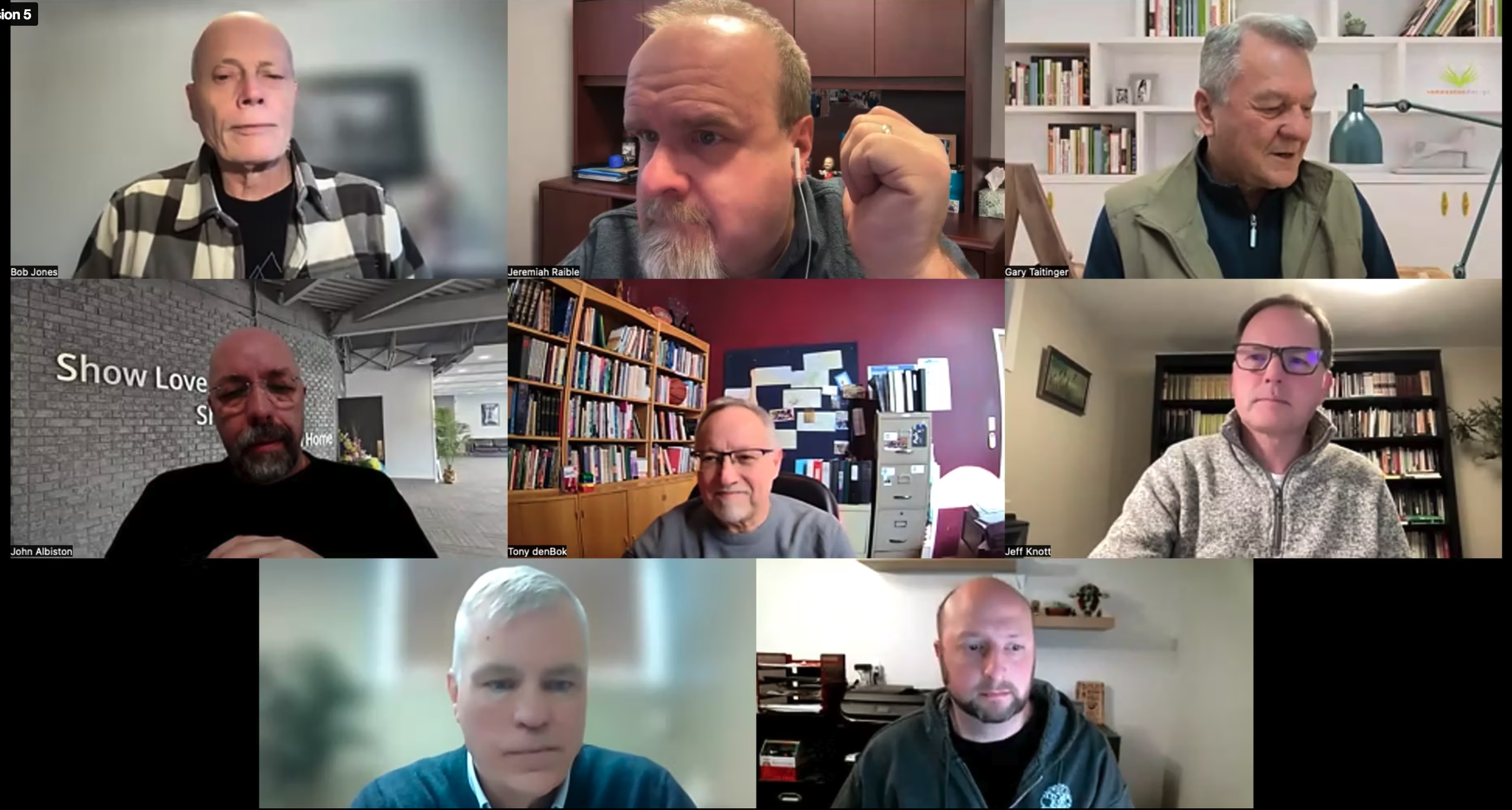NETWORK LEADERS LEARNING COMMUNITY
Across Canada, many denominational and network leaders are navigating the challenge of plateaued or declining churches within their care. The pressing question is: how can we help churches move from decline to vitality by reaching and discipling lost people?
This moment presents a powerful opportunity for leaders to step forward with quiet courage—guiding pastors and churches toward renewal, growth, and greater Kingdom impact.
Session 6
The session centers on network and denominational leaders reflecting on the challenges and opportunities of leading church networks toward greater mission-focused fruitfulness. Speakers describe the shift from local church pastoring to overseeing broader networks, noting the limitations of influence, the need to work within inherited structures, and the importance of casting clear Great Commission–driven vision. They compare governance models, discuss pastors as gatekeepers, and emphasize influence over control, particularly through engagement, relationship-building, coaching, and strategic communication. Much of the conversation highlights the value of data-informed leadership, equipping pastors, and creating a supportive “resource center” culture rather than a bureaucratic one. Leaders share experiences of revitalization efforts, challenges with struggling churches, the importance of pastoral transitions, and the gradual culture change achieved through intentional contact, training, and relational investment. The meeting concludes with encouragement toward collaboration across denominations, upcoming leadership development opportunities, and prayer.
SESSION 5
Summary: The session introduces a cohort focused on the unique challenges of denominational and network leadership—spaces where leaders often face complex issues without much written guidance or peer conversation. Using Gil Rendle’s Quietly Courageous as a foundational text, the group explores how leaders can navigate uncertainty, resist unhelpful assumptions, and act with agility and spiritual grounding.
Participants are guided to reflect on the book’s key ideas through pre-readings, small-group discussions, and large-group debriefs. The facilitator emphasizes developing shared language for network leadership, discerning what faithful leadership looks like amid change, and applying insights directly within each participant’s organization. Overall, the cohort seeks to create a thoughtful, collaborative environment for leaders to process real-world challenges and strengthen their capacity for courageous, adaptive ministry.
Session 1
It all begins with an idea.
Summary: The discussion emphasized that leadership begins with honestly defining current reality, which has changed so much that it demands new courage and approaches. Churches that were once vibrant are struggling, while others are growing, creating tension and perceptions of competition. Leaders noted the shift in culture from Christian assumptions to widespread spiritual illiteracy, especially among Gen Z. The church must recover its prophetic voice, encourage authenticity, and provide support without discouraging struggling pastors. Ultimately, hope lies not in politics but in the church’s mission to pursue the Great Commission with focus and faith. The session ended with participants reflecting on personal takeaways to apply in their own contexts.
SESSION 2
It all begins with an idea.
Summary: The discussion highlighted that leaders must adapt to new, complex realities rather than simply trying to “fix” problems. True assurance comes from trusting that God fully knows what we only partially understand, with faith, hope, and love as essential anchors. A key tension in leadership is balancing purpose and relationship—both are necessary, but denominational staff often lean toward purpose. Churches and networks that plateau or decline face inertia, like being stuck in a snowdrift, requiring intentional strategy, outside input, and collaboration to regain momentum. Growth cannot be dismissed as merely “God’s job”; leaders must actively engage in renewal while trusting Him. The session ended by encouraging participants to apply one concrete takeaway in their leadership this week.
SESSION 3
It all begins with an idea.
Summary: The conversation reflects on how congregations can become polarized when people rely on differing memories of the past, which drains energy for mission and ministry. Leadership transitions, accelerated by disruptions like COVID-19, highlight the need for adaptive leadership rather than reactive leadership. Leaders must learn to grieve change, let go of the past, and confront conflict rather than remain in stalemates.
Metrics of ministry should shift from measuring inputs (attendance, activity) to outcomes (impact and transformation). Challenges for network leaders are distinct from pastoring a local church—particularly the loneliness, constant conflict, and high emotional toll. Yet, reliance on God’s sovereignty, supportive networks, and cross-denominational unity provide strength. The conversation ends on a hopeful note, emphasizing shared faith in Scripture and in Jesus as the world’s hope as the foundation for collaboration.
SESSION 4
It all begins with an idea.
Summary: The meeting focused on providing participants access to resources from previous cohorts and expressing gratitude for everyone’s contributions. It concluded with a prayer for the church, asking for God’s guidance, strength, humility, and hope in challenging times. The prayer emphasized gratitude for both simple and difficult blessings, the importance of spiritual resilience, and a request for renewal, joy, and readiness to face the week ahead.
90 90 NETWORK LEADERS LEARNING COMMUNITY CONVERSATIONS
It all begins with an idea.
Session 1
Summary: In this meeting, the group scheduled their next gathering for February 26th, asking Jason and Jeff to each prepare a 10-minute presentation for a trade show-style session. Before closing, they confirmed that documents would be shared by email for anyone who missed the download and briefly discussed announcing the next topic. The call ended with a prayer for James, who is navigating challenges with a congregation and its leader, asking for wisdom, strength, and guidance in resolving the situation.
SESSION 2
Summary: The conversation centered on recovering the role of evangelists within the local church and building healthier leadership development systems. Evangelists were described as essential for equipping the church to take the whole gospel to the whole world, yet often underutilized. Speakers challenged the inherited “clergy culture,” where ministry is centralized in professionals, and instead urged creating multipliers—leaders who develop leaders. This requires intentional pipelines, coaching, peer networks, and structures that identify and train people at various stages of leadership (self, others, leaders, multipliers).
Examples included new credentialing processes, coaching for candidates, flexible and affordable training pathways, and expanded recruitment to second-career and retired individuals, not just youth. District leaders emphasized cultivating healthy leaders to produce healthy churches, embedding the call of God into all ministry contexts, and ensuring practical training in areas like HR and finance alongside preaching.
The discussion concluded with a call for patience and courage in shifting church culture, expanding recognition of diverse gifts (apostolic, evangelistic, pastoral, etc.), and working closely with church boards to multiply leaders. Each denomination must adapt these approaches to its own reality, but all share the need to move beyond linear pipelines toward ecosystems of leadership development.
SESSION 3
Summary: The session explored leadership succession as a constant challenge for sustaining the church’s mission, from the early apostles through denominational history. Transitions can either renew culture or slip into maintenance and decline, with local church successions proving especially decisive. The key is not whether leaders are chosen from inside or outside, but whether their strengths align with the organization’s needs. Mismatches in pace, theology, governance, or experience can derail the process. Healthy succession requires leaders to leave before overstaying, surrender control of timing, and prioritize the organization’s future over personal legacy. Ultimately, leadership is a relay race where the baton must be passed well for the mission to continue.
SESSION 5
The video presents an orientation session for a leadership cohort designed specifically for denominational and network leaders who often operate without clear models, peer support, or shared language for the unique challenges of their role. The facilitator explains that the cohort will use Gil Rendle’s Quietly Courageous as a guide to explore themes like assumptions, adaptive leadership, and the complexity of leading systems rather than individual churches. He outlines how each session will mix personal reflection, small-group discussion, and teaching to help leaders think more clearly about their influence, navigate organizational challenges, and apply practical insights to their own ministry contexts. Overall, the video sets the tone for a collaborative, thoughtful learning environment aimed at strengthening leaders who typically carry heavy responsibilities with little structured support.
SESSION 6
Our meeting focused on preparing for and engaging in a substantive presentation and peer-learning session around church revitalization, discernment, and the complexities of church closures.
Church Closure Discernment Insights
Koon Wah Leung offered a rich overview of the church closure discernment process, emphasizing the balance between spiritual sensitivity and operational diligence. Key insights included:
The importance of accurate data, thorough documentation, and continuous improvement.
Recognizing post-COVID shifts and helping congregations reimagine ministry models.
Reviewing financial health, employment implications, ministry viability, and congregational capacity.
Approaching every closure conversation as a process of spiritual discernment, seeking God’s direction.
Koon also highlighted several financial assistance programs available through CBOQ that support churches navigating sustainability challenges.


